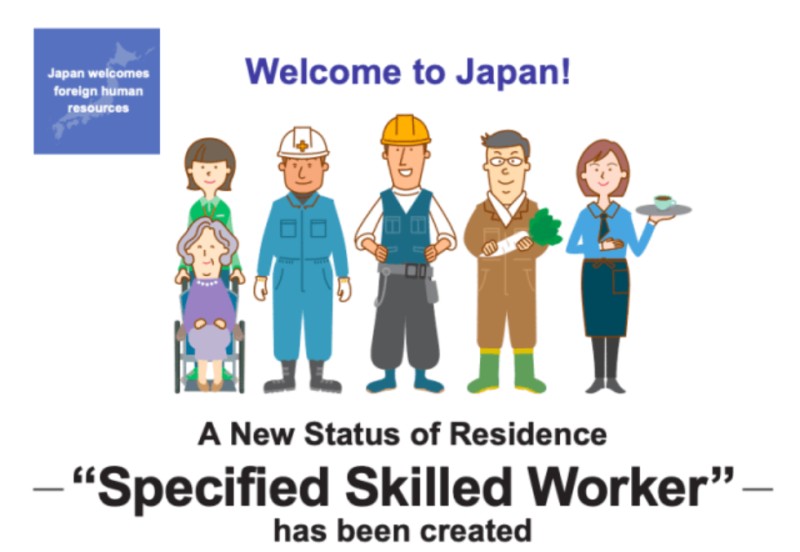Aun Consulting, a global marketing expansion firm, conducted a cross-national survey to explore perceptions of Japan across 14 countries. Participants were asked, “Do you love Japan?” with four response options: “Love”, “Like”, “Dislike”, and “Hate.” Remarkably, both the Philippines and Indonesia scored a 100% favorability rate, with all respondents expressing either “Love” or “Like” for Japan.
While both nations showed strong affection for Japan, the reasons behind their admiration differed slightly. Filipinos cited their love of Japanese food, followed by high-quality products and beautiful nature. Indonesians, on the other hand, were drawn to Japan’s natural beauty, followed by product quality, food, culture/history, and public safety, with manga and anime also resonating strongly.
 Understanding Worker Presence: The Philippines vs. Indonesia
Understanding Worker Presence: The Philippines vs. Indonesia
According to JETRO (2025), the Philippines currently has more foreign workers in Japan (approx. 240,000) than Indonesia (approx. 170,000), despite Indonesia’s much larger population. One of the factors is cultural and religious considerations. While Indonesia is the world’s largest Muslim-majority nation, dietary restrictions and concerns about prayer access can sometimes create hesitation among potential workers. By contrast, the Philippines, predominantly Christian, faces fewer cultural mismatches, especially in food and religious practices. Despite these differences, more inclusive practices in the workplace can help ensure all workers feel welcome—regardless of background.
Six Strategic Actions Japanese Companies Can Take Today
To further attract and retain Indonesian talent under Japan’s Specified Skilled Worker (SSW) and internship schemes, here are six practical and impactful steps your company can implement:
1. Provide Industry-Specific Japanese Language Training
Collaborate with certified LPKs (language training centers) in Indonesia to offer Japanese language courses that are tailored to the target industry (e.g., manufacturing, food service). While JLPT N3 may be the technical requirement, it lacks the sector-specific vocabulary needed for daily work.
For example, supplementing classes with phrases like:
「ドライバーを渡してもらえますか?」(Could you please pass me the screwdriver?)
「ホッチキスを貸してもらえますか?」(May I borrow the stapler?)
can make a real difference in workplace communication.
Incentivizing language success, such as offering exam fee reimbursement for passing JLPT N4 or N3, is also highly effective. Consider offering larger rewards for N3, as it presents a significant jump in difficulty.
2. Collaborate with Muslim Communities in Japan
By partnering with organizations such as the Japan Muslim Association (日本ムスリム協会), your company can ensure a culturally respectful environment. These organizations can advise on:
– Designing prayer rooms
– Identifying qibla directions
– Sourcing halal-certified meals (Japanese or Indonesian-style)
These accommodations not only show respect for religious practices but also foster a more inclusive and productive work environment.
3. Implement a Mentorship Program with Indonesian Senpai
Assign a senior Indonesian worker as a mentor (“senpai”) for new hires. This senpai can:
– Offer emotional support
– Assist in language learning
– Organize cultural and recreational activities
This peer-to-peer approach enhances team cohesion and reduces homesickness—one of the top causes of early return.
4. Communicate Transparent Career Pathways
From the very start of any program, clearly outline the skill advancement track within the company. For example: Trainee → Line Leader → Supervisor.
A transparent system dispels misconceptions and builds long-term commitment by showing workers that their efforts can lead to meaningful progression.
5. Create “Day in the Life” Video Content
Ask current Indonesian workers to produce a short video: “A Day in the Life of an Indonesian Worker in Japan”.
Support them by:
– Helping with subtitles (in Indonesian and Japanese)
– Providing basic filming equipment (or smartphones)
– Ensuring privacy and media consent
This helps bridge the expectation gap for future recruits and can also foster empathy and understanding among Japanese team members.
6. Incorporate Case-Based Interviews to Evaluate Emotional Intelligence
To ensure high-quality hires and prevent future workplace conflict, consider using case study-style questions in Japanese to assess cultural awareness and emotional maturity. For example:
「挨拶を無視されたらどうしますか?」 (What would you do if your greeting was ignored?)
「インドネシア人の同僚がいじめられているのを見たら、上司に報告しますか?」 (If you saw your fellow Indonesian colleague being mistreated, would you report it?)
「SNSで『インドネシア人は信用できない』という投稿を見たら、どう対応しますか?」 (If you came across a post saying “Indonesians can’t be trusted,” how would you respond?)
These questions allow employers to assess how candidates handle realistic, sensitive situations in a culturally appropriate and constructive way. While public opinion regarding foreign workers in Japan has fluctuated in recent years, thoughtful hiring practices such as these can contribute to a more harmonious, diverse, and productive workforce.
Final Thoughts
The affection for Japan among Indonesians and Filipinos is clear—but motivations, challenges, and expectations differ. By addressing these nuances with thoughtful programs and culturally adaptive support, Japanese companies can unlock the full potential of these talented workers while promoting mutual understanding and long-term retention.
You made it to the end of the article!
For more articles, click here.











